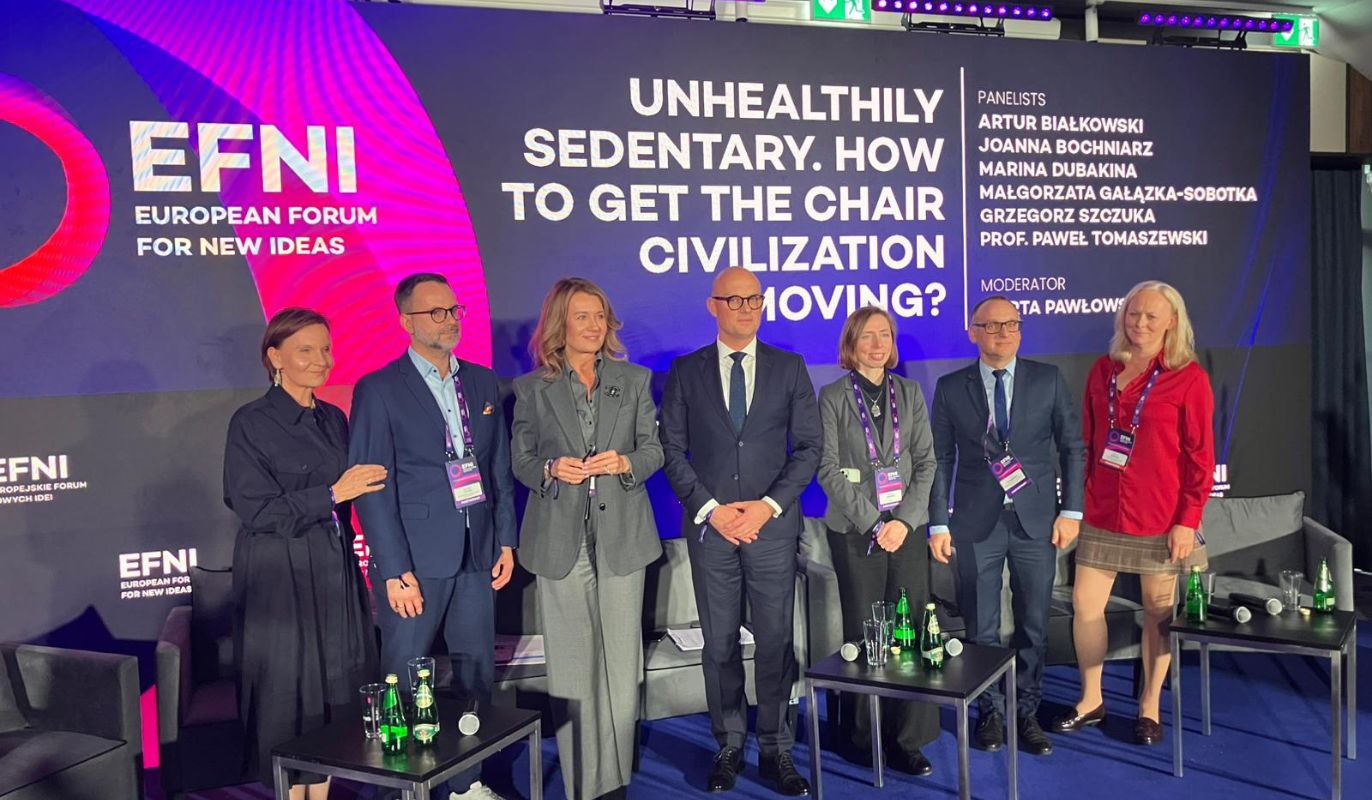The European Forum for New Ideas is one of the most important economic events in Poland – a meeting place for leaders from business, academia, public administration, and civil society, who come together to discuss the challenges of the modern world. This year, public health, the prevention of lifestyle diseases, and the fight against obesity were among the key topics featured.
Once again, the Stop Obesity Partnership served as a supporting partner of the Forum, co-organizing a debate titled: “Unhealthily Seated. How to Get the Armchair Civilization Moving?”
The discussion focused on the consequences of a sedentary lifestyle and ways to inspire people in Poland to move more – at home, at work, in schools, and in public spaces. The panel took place on October 16 at 4:00 p.m., bringing together experts from various sectors: health, education, local government, business, and science.
Panel participants:
- Artur Białkowski – Vice President of the Management Board, Medicover Polska
- Joanna Bochniarz – Center for Innovative Education
- Marina Dubakina – President and Managing Director for Sustainability, IKEA Retail Poland
- Małgorzata Gałązka-Sobotka – Director of the Institute of Healthcare Management, Łazarski University
- Grzegorz Szczuka – Director of the Gdańsk Shared Services Center, Plenipotentiary of the Pomeranian Voivode
- Paweł Tomaszewski – Vice-Rector for Science, Józef Piłsudski University of Physical Education in Warsaw
The discussion was energetically moderated by Marta Pawłowska from the Stop Obesity Partnership.
On the “Three-Chair Civilization”
As Marta Pawłowska pointed out:
“Since the 1960s, key adverse changes have occurred in people’s diets, a decline in physical engagement, and a rise in screen time. The result? The emergence of a three-chair civilization – one chair at work or school, one in the car, and one at home. The outcome? A skyrocketing rate of obesity, declining physical activity, and a loss of fitness among children.”
The statistics are alarming – in Poland, sugar consumption in the 1950s averaged around 20 kg per person per year, today it exceeds 50 kg. At the same time, we move less, leading to serious health and social consequences. A similar trend is observed globally – in the U.S. in the 1950s, 70% of occupations required moderate physical activity, today it is just 20%.
Experts on the Direction of Change
Participants unanimously emphasized that lifestyle and public health are the outcomes of many interdependent factors and require coherent, systemic solutions.
“Lifestyle is the result of synergy – the home initiates, the system supports, and the ecosystem integrates. The future belongs to cross-sectoral solutions that combine individual and institutional responsibility.”
— Małgorzata Gałązka-Sobotka, Director of the Institute of Healthcare Management, Łazarski University
“Healthy Courage – Success in Motion, Medicover Polska’s scientific program aimed at employees, has proven that caring for employee well-being and promoting regular physical activity have a real impact on company performance – not only in terms of team efficiency, but also through measurable reductions in employer costs due to absenteeism and presenteeism.”
— Artur Białkowski, Vice President of the Management Board, Medicover Polska
“System-building should start from the ground up. Local governments play a key role as they are closest to the challenges of their communities. They should be rewarded for implementing public health initiatives – this would finally end the era when public health is orphaned, with no clear owner.”
— Grzegorz Szczuka, Director of the Gdańsk Shared Services Center, Plenipotentiary of the Pomeranian Voivode
“We need coherent, systemic actions – combining education and awareness-building with institutional solutions, support for schools and families, and financial and tax incentives for employers. Only broad cooperation and consistent health policies can create a culture of movement, where activity becomes a daily habit and health – a true social value.”
— Paweł Tomaszewski, Vice-Rector for Science, Józef Piłsudski University of Physical Education in Warsaw
Every Step Counts
Participants agreed that lifestyle change starts with small steps – walking instead of driving, taking the stairs instead of the elevator, or playing actively with children. Inspiring children and youth to move is particularly important so that from an early age they learn that activity means joy, freedom, and energy.
A Shared Mission
We thank all speakers and participants for an inspiring discussion full of concrete ideas.
The conclusions and recommendations from the debate will be further developed and promoted as part of the activities of the Stop Obesity Partnership, which advocates for healthy lifestyles and supports initiatives for a healthy, active Europe.

